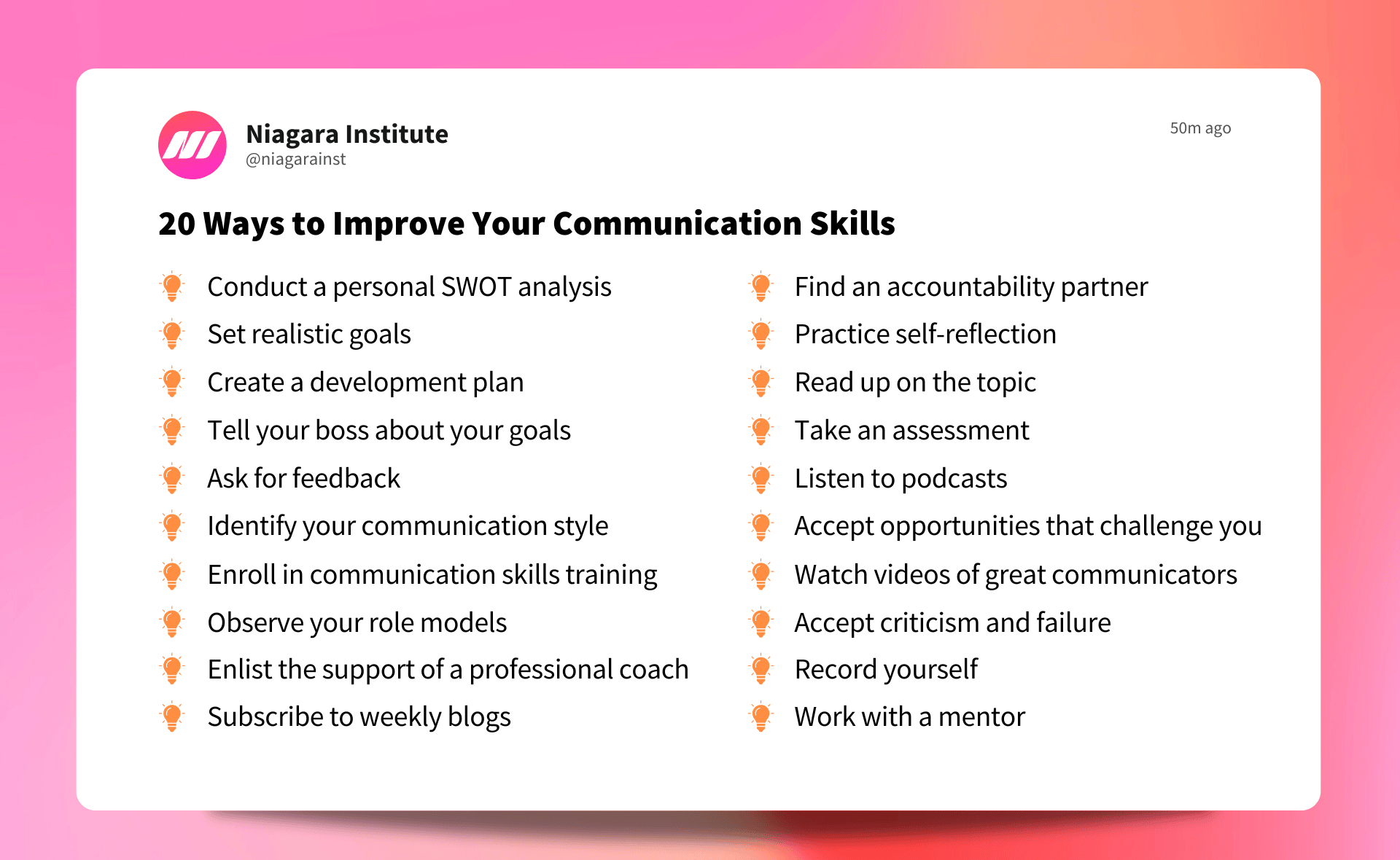4 min read
How To Deal With Poor Communication In the Workplace
So, you’ve recognized the signs of poor communication. You realize the potential effects it can have if left unchecked and are prepared to do...
5 min read
 Michelle Bennett
:
Nov 28, 2023 5:00:00 AM
Michelle Bennett
:
Nov 28, 2023 5:00:00 AM
.png)
So, your goal is to improve your communication skills? To become someone who can communicate in the workplace with confidence? No problem. We’re going to help you make that a reality.
In this article, you’ll find 20 ways to improve your communication skills. There is a mix of ideas that will cost you nothing and others that will cost something. The idea is that over time and with the right amount of commitment, using some combination of these ideas will help you achieve your goal of upskilling your communication skills.

One of the best things you can do to get started is to conduct a Personal SWOT Analysis. This is a simple exercise that has the potential to produce invaluable information about your strengths, weaknesses, opportunities, and threats, but only if you’re willing to be completely honest with yourself.
If you want to improve your communication skills, you must first have a clear picture in your mind about where you want to go, why that’s important to you, and what success will look like. In other words, you need to set realistic SMART goals. Consider this your “do not pass go,” as these goals will inform every decision you make or action you take afterward.
With the information from your SWOT analysis and your defined goals, draft up a development plan that’s focused on your communication skills. It should break down your goals into more manageable steps and outline what resources you need to achieve said goals.
If your goal is to upskill your communication skills, and you have an idea of how you’re going to make that happen, tell your boss about it. While that might make you feel vulnerable, research has found that “sharing your goals with a higher-up does more than keep you accountable, it also makes you more motivated, simply because you care what this person thinks of you.”
At every step in your journey to improve your communication skills, ask your teammates, boss, and peers in other departments that you work cross-functionally with for honest, constructive feedback. It won’t be easy to hear some of it, but it’s not supposed to be. Feedback is supposed to be challenging. It’s how you grow.
There are four major communication styles - passive, passive-aggressive, aggressive, and assertive. Depending on what communication style you naturally lean towards, it can impact how effective of a communicator you are. Take the Communication Style Quiz to find out which yours is so you can determine if it’s helping or hindering you at work.
Communication training is among the most popular ways professionals improve communication skills. Avoid programs that focus too heavily on theory, though. Programs such as Niagara Institute’s bestselling program, Speaking as a Leader, are better suited for most professionals because they focus on allowing you to practice applying the learning in a risk-free and safe environment. This way, you’re ready to go back to your everyday life on the job immediately prepared to put your newfound knowledge to work.
Observational learning is great when it comes to improving your communication skills because it costs nothing to do. All you have to do is make an intentional effort to observe skilled communicators you look up to, evaluate the pros/cons of their approach, and then emulate their techniques in the appropriate situations.
One-on-one coaching is the ideal alternative (or addition!) to communication skills training because it’s a truly personalized learning experience. The job of a professional coach is to be 100% focused on your needs and goals, as well as dive deep into helping you improve your areas of weakness.
Improving your communication skills doesn’t happen overnight. It takes continuous effort over an extended period of time to achieve. Fortunately, an easy way to support this goal is to subscribe to weekly blogs, such as Niagara Institute’s for everyday leaders. With practical blogs that can be read in under 10 minutes, you can learn something new about communication even during your busiest weeks.
As the name suggests, an accountability partner is someone who holds you accountable for your goal of becoming a better communicator. It doesn’t matter if you choose a coworker on your functional team or a friend from another department, so long as you choose someone who’s willing to be honest with you and challenge you.
Self-reflection will be a key tool in your toolbox when working on improving your communication skills. Not only does it prompt you to think more deeply than you might otherwise about your communication habits, techniques, and experiences, but it helps you identify patterns, strengths, and weaknesses that you can then make an intentional effort to either harness or overcome. To help you do this, use the Gibbs Reflective Cycle.
There are over 60,000 books on the topic of communication on Amazon to choose from. If you’re unable to commit to a full-length book, though, opt for shorter guides such as The Guide to Overcoming Bad Communication at Work.
An underrated way to improve not just your communication skills but any soft skill in the workplace is to take an assessment. A 360-degree feedback assessment is one of the most popular options as it combines a self-evaluation with feedback from sources who interact with you regularly (boss, subordinates, peers, coworkers, etc.) in order to identify your strengths and weaknesses.
Podcasts like The Inspire Podcast, which is hosted by one of Niagara Institute’s content partners, are an excellent way for even the busiest professionals to learn something new about communication on the go.
If you want to learn something new or improve your skills, you have to step outside of your comfort zone. Going forward, make a point to look out for opportunities that challenge you to practice a new communication technique or hone your skills, and then seize them.
Just as you might observe a leader within your company who is a great communicator, you can do the same by watching videos of famous communicators such as Steve Jobs, Brené Brown, Martin Luther King Jr., and Oprah Winfrey.
When it comes to improving your communication skills, embracing criticism and recognizing failure is part of the learning process. Is it easy? No. Is it worth it? Absolutely! Criticism and failure can open your eyes to development opportunities and gaps in your communication skills that you might not have noticed otherwise.
It’s one thing to communicate. It’s a whole other to watch yourself communicate. While there’s no doubt this exercise can be uncomfortable, recording yourself can make you think twice about your techniques and approach so that you can then improve them.
A mentor is someone whose been in your shoes before. They’re someone you trust, someone who can act as your sounding board, and someone who is invested in seeing your success. This is an invaluable resource to have on your side when working on a lofty goal, such as improving your communication skills.
.png)
4 min read
So, you’ve recognized the signs of poor communication. You realize the potential effects it can have if left unchecked and are prepared to do...
.png)
3 min read
If you’re just starting the process of finding communication skills training for either yourself or a group of employees or leaders you oversee, you...

5 min read
Have you ever been told you come off as intimidating or aggressive at work but can’t figure out why? Your paraverbal communication may be to blame.